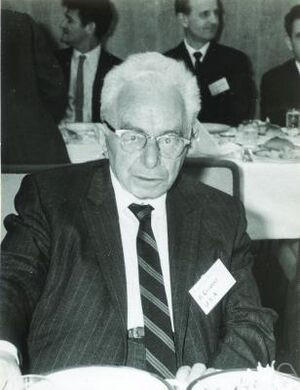Richard Courant (nonfiction): Difference between revisions
Jump to navigation
Jump to search
(Created page with "thumb|Richard Courant.'''Richard Courant''' (January 8, 1888 – January 27, 1972) was a German American Mathematician (nonfiction)|mathematicia...") |
No edit summary |
||
| Line 2: | Line 2: | ||
He is best known by the general public for the book ''What is Mathematics?'', co-written with Herbert Robbins. | He is best known by the general public for the book ''What is Mathematics?'', co-written with Herbert Robbins. | ||
Commenting upon his analysis of experimental results from in-laboratory soap film formations, Courant believed that the existence of a physical solution does not obviate mathematical proof: | |||
<blockquote>Empirical evidence can never establish mathematical existence--nor can the mathematician's demand for existence be dismissed by the physicist as useless rigor. Only a mathematical existence proof can ensure that the mathematical description of a physical phenomenon is meaningful. | |||
</blockquote> | |||
== In the News == | == In the News == | ||
Revision as of 12:12, 29 December 2016
Richard Courant (January 8, 1888 – January 27, 1972) was a German American mathematician.
He is best known by the general public for the book What is Mathematics?, co-written with Herbert Robbins.
Commenting upon his analysis of experimental results from in-laboratory soap film formations, Courant believed that the existence of a physical solution does not obviate mathematical proof:
Empirical evidence can never establish mathematical existence--nor can the mathematician's demand for existence be dismissed by the physicist as useless rigor. Only a mathematical existence proof can ensure that the mathematical description of a physical phenomenon is meaningful.
In the News
Fiction cross-reference
Nonfiction cross-reference
External links:
- Richard Courant @ Wikipedia
